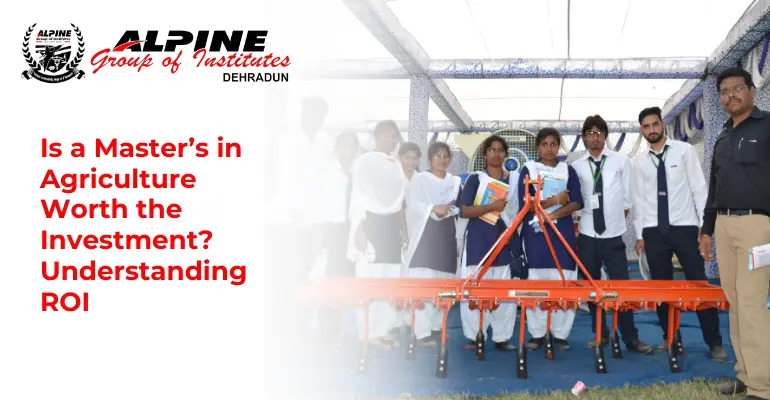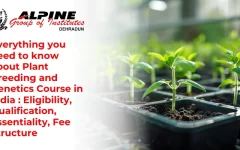Is a Master’s in Agriculture Worth the Investment? Understanding ROI
2025-07-05 9:24Is a Master’s in Agriculture Worth the Investment? Understanding ROI
Deciding to pursue a Master’s in Agriculture is a significant investment of both time and money, and it’s natural to wonder if the return on investment (ROI) justifies the commitment. After all, graduate school is not just about tuition fees and textbooks, it’s about the career opportunities, earning potential, and personal fulfillment that come with advanced education. So, is a Master’s in Agriculture worth it? The short answer is: yes, but the long-term benefits depend on how you define ROI. With the rising cost of graduate education, many prospective students are understandably focused on the return on investment (ROI) of such a degree. A Master’s in Agriculture, helps you understand the potential payoffs of this advanced degree.
Financial ROI: Potential Salary Increase and Job Security
One of the most immediate concerns when considering a graduate degree is its financial return, how much will you earn compared to the cost of education, and how quickly will you see a return on that investment?
Salary Increases
While salaries can vary based on the country, industry, and area of specialization, a Master’s in Agriculture generally leads to higher earning potential compared to a bachelor’s degree. According to the U.S. Bureau of Labor Statistics, for example, those with a master’s degree in agricultural sciences or agribusiness can see salaries increase by 20% to 40% over those with just a bachelor’s degree in the same field. These are a few examples of potential salaries based on the role:
- Agricultural Manager: $70,000–$100,000 per year (with a Master’s in Agriculture, this can be on the higher end)
- Agronomist: $60,000–$90,000 per year
- Agricultural Economist: $75,000–$110,000 per year
- Farm Manager: $60,000–$90,000 per year
- Agricultural Consultant: $70,000–$100,000 per year
- Policy Analyst or Advisor: $80,000–$120,000 per year
In contrast, individuals with only a bachelor’s degree in agriculture typically earn lower salaries, especially in entry-level positions. A graduate degree can open doors to higher-paying, more specialized roles that demand advanced expertise.
Diverse Career Paths
Agriculture isn’t just about farming, it’s a complex, multifaceted industry with many different career paths. These are a few options you can explore with a Master’s degree in Agriculture:
- Agricultural Research and Development: If you’re interested in cutting-edge research, you could work on developing genetically modified crops, researching sustainable farming techniques, or studying the impacts of climate change on agriculture.
- Agribusiness and Marketing: Many agriculture graduates work in agribusinesses, overseeing the production, distribution, and marketing of agricultural products, or managing agricultural commodities and supply chains.
- Environmental and Sustainability Careers: If you’re passionate about sustainability, a master’s degree in agriculture with a focus on environmental science or agroecology can lead to roles in conservation, environmental policy, or sustainability consulting.
- International Development: Many agricultural experts with advanced degrees work with international organizations to help improve food security, agriculture practices, and rural development in developing countries.
Specialization Opportunities
A master’s program in agriculture typically allows you to specialize in areas like – Agronomy, Horticulture, Plant genetics and breeding, Soil Science, Agricultural Economics, Agri-Tech, Rural Development, Food Security, and Sustainable Agriculture. These specializations give you a competitive edge in niche areas of the industry, allowing you to become an expert in high-demand fields, which can result in career advancement and higher salaries.
- Personal Fulfillment and Impact on Society
Beyond the financial and professional benefits, one of the most profound returns on investment is the personal fulfillment and sense of purpose that comes with earning a Master’s in Agriculture. For many, working in agriculture isn’t just about earning a paycheck, it’s about making a difference in the world.
Making a Difference
The agricultural sector is facing some of the most pressing global challenges today, including climate change, food security, sustainable development, and poverty alleviation. With a Master’s in Agriculture, you have the opportunity to be part of the solution to these critical issues. Whether it’s through developing drought-resistant crops, improving agricultural efficiency, or influencing policy to create more sustainable food systems, a master’s degree provides you with the tools to make a tangible difference.
For women and underrepresented groups, a graduate degree in agriculture can also provide opportunities to break through barriers and establish themselves as leaders in a traditionally male-dominated industry. This personal sense of achievement can be deeply rewarding.
Continuous Learning and Intellectual Satisfaction
A Master’s in Agriculture also offers intellectual satisfaction. Agriculture is a dynamic and evolving field, and graduate programs often focus on the latest technologies, scientific advancements, and policy innovations in the industry. As an agricultural professional with a master’s degree, you’ll be continually learning and adapting to new challenges and opportunities, which can keep you intellectually engaged throughout your career.
Cost of Education vs. Long-Term Benefits
One of the key concerns for prospective graduate students is the cost of tuition and the potential student debt they will incur. The cost of a Master’s in Agriculture varies depending on the country, program, and institution. However, in many cases, the long-term benefits are- higher earning potential, career advancement, job security, and personal fulfillment which outweigh the initial financial investment.
Many agricultural master’s programs also offer opportunities for scholarships, fellowships, or assistantships that can help offset costs. Additionally, the ROI is often realized quickly, with graduates able to secure higher-paying positions within a few years of completing their degree.
Conclusion: The Long-Term ROI of a Master’s in Agriculture
Earning a Master’s in Agriculture is not just an investment in your career, it’s an investment in the future of global food systems, sustainability, and innovation. From the financial benefits of higher salaries and greater job security to the personal fulfillment of contributing to global agricultural challenges, the ROI of this degree is significant.
If you are passionate about making a positive impact in agriculture and ready to take on leadership roles in an evolving industry, a Master’s in Agriculture offers a pathway to achieve both professional success and personal fulfillment. The long-term benefits of both financial and societal, make it a worthwhile investment for those committed to shaping the future of agriculture.
While the initial cost of graduate education can seem daunting, the long-term financial, professional, and personal rewards are significant. From higher earning potential and career advancement opportunities to the ability to specialize in high-demand fields, the benefits of a master’s degree in agriculture can far outweigh the investment.
Whether you’re interested in research, policy development, or agribusiness management, the degree provides the tools, knowledge, and network necessary to succeed.
Ultimately, the ROI of a Master’s in Agriculture is not just measured in terms of salary increases or career promotions. It is also reflected in the personal fulfillment that comes from contributing to the solution of global agricultural challenges, and in the satisfaction of making a tangible difference in the world. For those committed to advancing their careers and leaving a lasting impact on the agricultural sector, a Master’s in Agriculture is undoubtedly a worthwhile investment.









